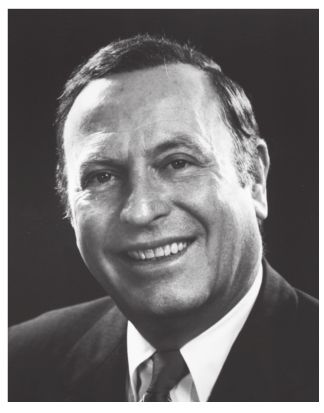
July 7, 1927-July 6, 2014
‘We’ll do the right thing for people.’
REMEMBERING | Robert E. Hartley
To the Illinois political world he was “Al the Pal.” During his 42 years as an elected public official he had the broadest grin around. He signed his letters “Your friend,” whether they were friends or not. By his own account he may have consumed more beer than the Anheuser and Busch family members combined. He had a gift for storytelling that entertained thousands.
Many Illinoisans will instantly recall that public image of Alan J. Dixon of Belleville, Illinois. But there was much of substance to his story, perhaps less widely known. This is a good time to recall the work that stands as Dixon’s public service legacy.
The first thing to remember about Dixon was his devotion to Belleville throughout his life. He loved the place and its people with all their shortcomings. During his early years, St. Clair County was not heaven on earth. Crime and corruption were its soulmates. Open gambling flourished. At the VFW hall in downtown Belleville there were slot machines and high stakes poker games. Surrounding the hall was the police station, city hall and county courthouse. He remembered it clearly: “Officials were in there from noon on, drinking and gambling.”
In his first election, for police magistrate in Belleville, he ran as part of the World War II veterans’ reform ticket. He recalled, “We all won. It was the whole culture of the time. The recurring theme was: We’ll do the right thing for people.” That attitude prevailed when he won election to the state House of Representatives in 1950 against the county Democratic machine.
The legislature in the 1950s had its own raw side. Dixon chose to associate with the small number of House members who fought against slipshod ethics, dubious handouts and payoffs. His compatriots included a young legislator and newspaper publisher from nearby Troy named Paul Simon. They formed a friendship based on honesty in public service and mutual values that saw them both through difficult times. Dixon said famously, “Paul and I were almost like brothers.” They differed in their styles and approaches, but they were friends when it counted.
In the Springfield environment, Dixon joined party leadership, but maintained an independent stance. For example, he bucked party leadership and voted against imposing a state income tax in 1969. He also found a special niche: judicial reform. He led a huge compromise effort in the General Assembly that ended with voter acceptance of an amendment to the state constitution’s judicial article. He always considered it his signature accomplishment. Dixon’s experience working with a multitude of special interests – lawyers, judges, and politicians of all stripes – served him well as a creative legislator.
Dixon moved to the state Senate in 1962, in what began a steady march from the legislature to state executive positions. When he was elected state treasurer in 1970 he had served nearly 20 years in the legislature, supported by the St. Clair County Democratic machine headed by East St. Louis Mayor Alvin Fields. Dixon knew what happened in the backrooms with the machine, but he remained independent and uncorrupted. He worked hard for the mayor’s programs and Fields pushed Dixon’s name forward for higher state offices.
No one doubted Dixon’s ambition, or his persistence in taking advantage of political opportunities. He was elected secretary of state in 1976. In state office Dixon proved to be an able and honest administrator. In 1980, when U.S. Sen. Adlai E. Stevenson III declined to run for re-election, Dixon jumped into the race and rode a strong statewide following to victory. He quickly established credentials as an inside operator, a senator who could work with the Republican administration of President Ronald Reagan on important issues.
In the U.S. Senate, Dixon was named to important committees, including Armed Services, on which he became chairman of the subcommittee responsible for a 40 percent cut of the defense budget, including military construction. On the Senate Banking Committee he headed a subcommittee on government contracting. Dixon earned a reputation for getting the work done, especially on Illinois issues. He was credited with saving Scott Air Force Base from being closed.
Dixon’s longtime aide in Springfield and Washington, Gene Callahan, summarized the man’s “unknown” side: “Dixon was the smartest man I ever worked for. People didn’t realize how astute he was.” Lynn Martin, former Republican congresswoman from Illinois, warned those tempted to draw conclusions about Dixon: “To underestimate Alan Dixon’s brains would be wrong.”
In one of the state’s biggest election upsets, Dixon lost his bid for reelection to the Senate in 1992. He returned to Belleville and to his wife, Jody, and family, where he drank an occasional beer, told stories, played golf, stayed connected with political friends, and practiced law with a major firm in St. Louis. Alan J. Dixon always could play hard and work hard.
Robert E. Hartley was assistant city editor for the East St. Louis Journal when he met Alan Dixon in 1962, shortly after Dixon’s election to the state Senate. Now Hartley, who lives near Phoenix, writes books about Illinois history and politics. For many years Dixon was a willing source of background information for Hartley’s books and articles.